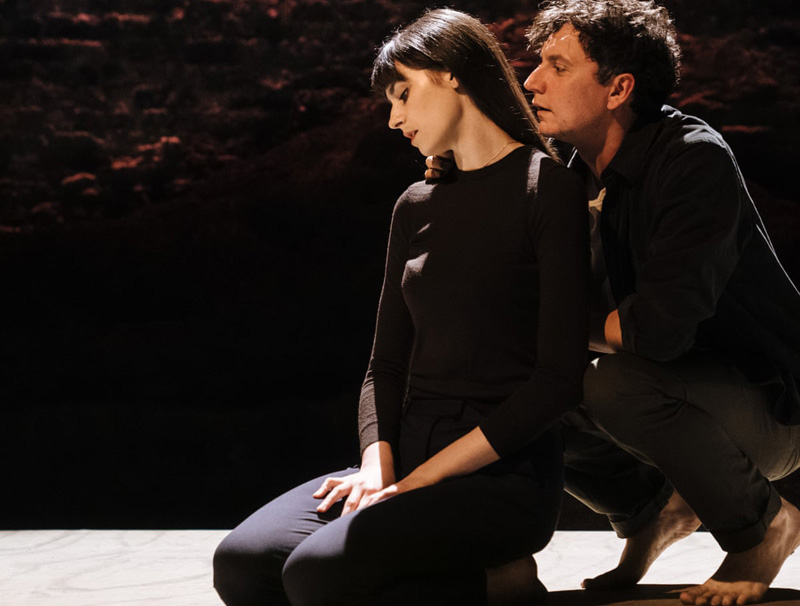“Love and Other Acts of Violence”: Donmar Warehouse
Julie Sorokurs in Covent Garden
21 October 2021
Love and Other Acts of Violence serves as the Donmar’s inaugural production after a 19-month-long closure for refurbishment. Directed by Elayce Ismail, Cordelia Lynn’s new, 90-minute play centres on the relationship between Her – a Jewish physicist (Abigail Weinstock) – and Him – a poet, historian, and political activist of Polish descent (Tom Mothersdale). Despite a poor first impression that Him makes at a party hosted by Her when both are postgraduates at the same university, the two embark on a ten-year relationship fraught with intergenerational trauma that is exacerbated by the fascist regime encroaching on their livelihoods and very rights as British citizens.

Abigail Weinstock and Tom Mothersdale. Photo credit: Helen Murray.
Fragments of their life together play out in front of us. Voiceovers (presumably his poetry) bookend each brief episode as Him and Her dance away and towards one another. But they never quite connect. The circumstances of both their families eclipse any respect and trust they could ever have in one another: we soon learn that Her and Him can trace their roots back to the same village in Poland where, in 1918, events during the Polish– Ukrainian War resulted in the well-documented slaughter of Jews by Polish soldiers and civilians (known as the Lwów pogrom). Her is quick to point out that it is unlikely that their two families would have been friendly with one another.
Throughout the first two-thirds of the play, we join Him and Her in media res as they debate such things as: the efficacy of protesting (if more people protested, he insists to a sceptical Her, “there would be more of your people left”), the increasingly real danger of the outside world knowing the physicist’s Jewish surname, and whether they should have a baby together. And all the while, out in an all too recognizable England, the immigration status of Britons like Her is coming under renewed scrutiny.
Their love for one another is not convincing enough to spark any real drama or tension in the theatre, but the contempt between them very much is. Most of the time they seem to speak at one another, rather than with one another, and the content of their horrific exchanges induces gasps from people in the audience. Years of tension and resentment build up and spill over into racist abuse they hurl at each other in moments of frustration and fear. The voiceovers, too, become less abstract and ruminative, and more blunt, more confessional – “Sometimes I wanted to murder her”.

Abigail Weinstock and Tom Mothersdale. Photo credit: Helen Murray.
There is very little chemistry between Him and Her, and at times I wondered whether Lynn’s play was lacking an integral detail that would make audiences believe in this relationship. Neither of them is particularly sympathetic or likeable either. Him is self-involved, aggressive, and unable to take on perspectives different from his own; one of the few times I felt compelled to agree with Her was when she told Him (though with relish and disdain) that he was “unintelligent”. But Her is equally frustrating, quick-tempered and gratuitously cruel as she is to him. Weinstock and Mothersdale are nevertheless excellent (Weinstock especially in her professional theatre debut) and uncompromising in delivering their lines (and physical punches).
They pace up and down a bare stage that consists of a slab of wood surrounded by mounds of dirt (stage design by Basia Bińkowska), and an identical piece of wood hangs high above them – visually recalling two magnets suspended in mid-air, in perpetual repulsion from one another. We later see this hanging bit of wood come crashing down onto the stage, a scene from just over a hundred years ago in war-torn Poland ready to play out on top of it.

Richard Katz as the great-grandfather. Photo credit: Helen Murray.
Richard Katz’s brief appearance in this part of the play as Her’s great-grandfather is gripping as he anxiously listens to the sounds of a pogrom gaining in momentum outside. Weinstock plays his daughter (Her’s grandmother), and the two fall into an intimate if not slightly strained banter to distract from the horrors taking place outside (“running around like a headless chicken only excites them”). While the dialogue itself could have done with a bit more editing to shave down some of the more heavy-handed allusions to the first part of the play, I still had a sizeable lump in my throat the whole time.
Mothersdale eventually comes marching onto the stage, this time as a Polish soldier. He proceeds to commit the very atrocities that Her accused Him’s ancestors of having committed. Parallels are also drawn between Him’s political activism and participation in increasingly violent protests, and the soldier’s willingness to murder Jews as part of his country’s fight to regain control over its “own” land and people.
People of course die on both ends of the fight against fascism, and Lynn’s play effectively comes across with the fine line that separates Him from the solider. But are they two sides of the same coin? And what about Her and her grandmother, is their family doomed to the consequences of history continuing to repeat itself?
Love and Other Acts of Violence seems in no way concerned about resolving any of these uneasy questions, and instead leaves them to linger in the theatre long after the lights go out.









